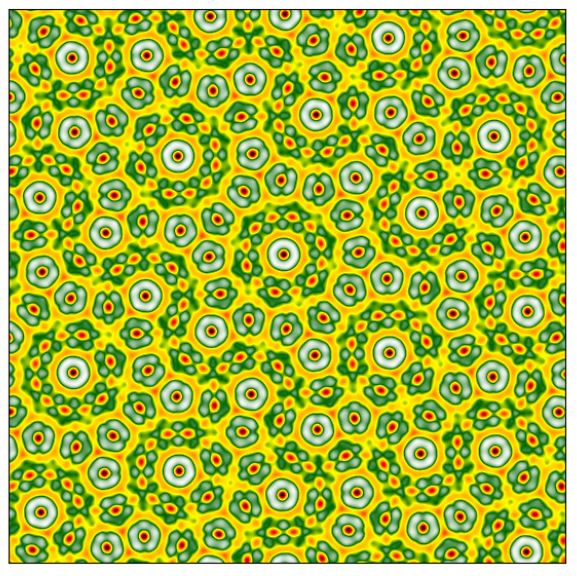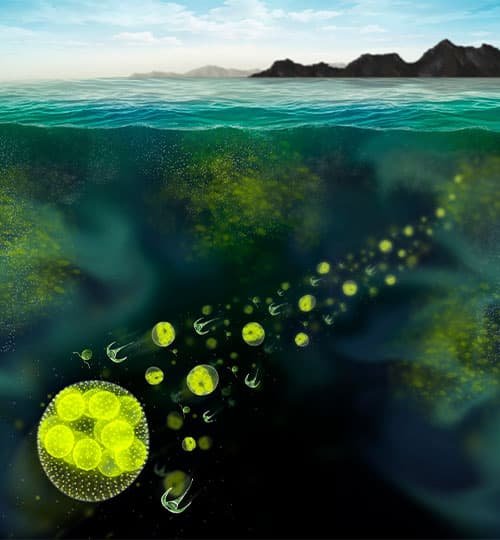Mathematical Modelling
In the Mathematical Modelling research group, we use a broad range of mathematical techniques to describe real-world processes. By developing model equations with physical parameters, we help to optimise processes or designs, and predict future behaviour of complex systems.
We have specialists with a diverse range of research interests from the mathematical modelling of biological processes and medicine to investigating radiation damage using atomistic models. The main themes of the group may be broadly described as Mathematical Biology, Materials Modelling, Soft Matter Science, Industrial Modelling, Fluid Mechanics, Quantum Physics and Technology, and Quantum Many-Body Dynamics. The research group has close links to the Interdisciplinary Centre for Mathematical Modelling, with close collaboration with colleagues from other departments.
The biological systems studied range from intracellular processes to those at the scale of organisms and populations. The fluid flows studied range from environmental buoyancy-driven flows to technologically important micro- and nanofluidic flows. The modelling of materials involves the use of mathematical and computational techniques to solve a wide and varied class of problems; this includes nanoscale devices where the fate of individual atoms is important. It spans length scales and time scales that vary over many orders of magnitude and involves the solution of equations that range from continuum to quantum mechanical descriptions. Finally, the dynamical behaviour of large aggregates of quantum particles is studied using numerical and analytical techniques, with a special emphasis on the emergence of universal features (such as the emergence of thermalisation).

David Sibley and Andy Archer are part of the organising committee for the British Applied Mathematics Colloquium (BAMC), the main annual UK conference in Applied Mathematics, which will be held in Loughborough in 2022.
Marco Discacciati one of the organisers of a mini-symposium on “Domain Decomposition Methods for Fluids” at the 20th International Conference on Fluid Flow Problems.
Achillaes Lazarides and Tapio Ala-Nissilä are part of the organising committee for a CECAM Flagship Workshop in Lausanne in January 2021, titled "Theory and Simulation Methodologies for Small Quantum System Dynamics and Quantum Thermodynamics (QUANTDYNA)".
Achillaes Lazarides is one of the organisers of a Royal Society Meeting in February 2021, titled "New perspectives on quantum many-body chaos”.
- Shaho Abdalla: Classical density functional theory for amorphous solids
- Agnes Bokanyi-Toth: Mathematical Modelling of Electrokinetic Phenomena in Foams
- Jonathan Brooks: Dynamical systems with plastic self-organising vector fields, which model cognitive systems
- Iain Brown: Psuedo potential fitting from ab initio data
- Jan Cammann: Study of the active motion of microorganisms, from motion of single cells to collective behaviour
- Christian Duffin: Quantum Many-Body Dynamics
- Adam Essex: Artificial intelligence in the form of neural networks explainable using the approaches of dynamical systems theory
- Ben Evans: Numerical approximation of parametric boundary value problems governed by elliptic partial differential equations
- Boshen He: Modelling the drying of colloidal films
- Louise Holford: Modelling evaporation, condensation and pattern formation of liquids on surfaces
- Naomi Howard: Pattern formation of droplets drying on surfaces
- Tom Mason: Theory and numerical simulations of the collective motion of active particles immersed in a complex fluid with anisotropic elastic interactions
- Bassey Oboho: Multi-scale Modelling of Solid Electrolyte Materials for Next-Generation Lithium-ion Batteries
- Jack Paget: Modelling active matter with liquid-crystalline ordering
- Liangzhi (William) Tan: Modelling high-entropy alloys using DFT
- Junzhe Zhang: Modelling of complex colloidal droplet motion.
